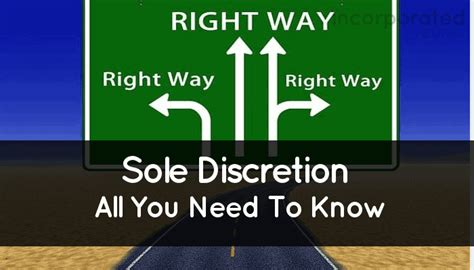Understanding Sole Discretion
Sole discretion refers to the exclusive and unrestricted authority granted to an individual or entity to make decisions without the need for prior approval or consultation with others. This concept is commonly encountered in various legal and business contexts, where a party is empowered to exercise judgment and make choices independently.

Key Characteristics of Sole Discretion
- Independent Decision-Making: The holder of sole discretion is authorized to make decisions without the influence or interference of external parties.
- Exclusive Authority: The scope of decision-making is restricted to the individual or entity granted sole discretion.
- Unconditional Power: Decisions made under sole discretion are not subject to challenge or overrule by others.
Applications of Sole Discretion
Sole discretion is frequently used in situations where prompt and decisive action is required, such as:
- Business Contracts: Companies often grant sole discretion to executives or managers to make decisions regarding hiring, firing, and investments.
- Legal Proceedings: Courts may vest judges with sole discretion in determining sentencing or granting injunctive relief.
- Governmental Agencies: Regulatory bodies and government agencies may be authorized to exercise sole discretion in issuing permits or imposing sanctions.
- Investment Management: Portfolio managers may be given sole discretion over investment decisions to optimize returns.
- Nonprofit Organizations: Sole discretion empowers board members or trustees to make strategic choices for the organization.
Balancing Power and Accountability
While sole discretion provides flexibility and efficiency, it also raises concerns about potential abuse of power. To mitigate these risks, several measures can be implemented:
- Clearly Defined Parameters: Establish clear boundaries and guidelines for the exercise of sole discretion.
- Regular Reporting and Oversight: Require regular reporting to ensure transparency and accountability.
- Independent Review: Consider independent review mechanisms to scrutinize decisions made under sole discretion.
- Limitations on Duration: Limit the duration of sole discretion to prevent excessive concentration of power.
Case Studies and Statistics
- A study by the American Bar Association found that 65% of corporate contracts contain provisions granting sole discretion to executives.
- In 2019, the U.S. Securities and Exchange Commission charged a portfolio manager with fraud for exceeding his sole discretion in investing client assets.
- The National Association of Corporate Directors recommends that boards of directors retain ultimate oversight authority, even if sole discretion is delegated to management.
Innovative Uses of Sole Discretion
Beyond traditional applications, new and innovative uses of sole discretion are emerging:
- Artificial Intelligence (AI): AI algorithms can be granted sole discretion to make decisions based on complex data analysis.
- Customer-Centric Design: Companies may empower customer service representatives with sole discretion to resolve customer issues promptly.
- Blockchain-Based Governance: Decentralized autonomous organizations (DAOs) utilize sole discretion to execute decisions autonomously.
Effective Strategies for Implementing Sole Discretion
- Clearly define the scope of authority and responsibilities.
- Establish a framework for accountability and transparency.
- Provide training and support to those exercising sole discretion.
- Foster a culture of ethical decision-making.
FAQs
-
What is the difference between sole discretion and arbitrary discretion?
Sole discretion involves independent decision-making within predefined parameters, while arbitrary discretion allows for decisions that are unreasonable or capricious. -
Can sole discretion be revoked?
Yes, sole discretion can be revoked or amended by agreement or through legal proceedings. -
What remedies are available if sole discretion is abused?
Remedies may include injunctions, damages, or voiding of decisions made under duress or fraud. -
How can I protect myself from the potential misuse of sole discretion?
Request clear documentation of the scope of discretion, seek legal advice, and consider independent review mechanisms. -
What are the ethical implications of sole discretion?
Ethical considerations include conflicts of interest, fairness, and the potential for biased decision-making. -
How does sole discretion impact stakeholder rights?
Stakeholders have a right to expect that decisions made under sole discretion are made in good faith and in their best interests.
